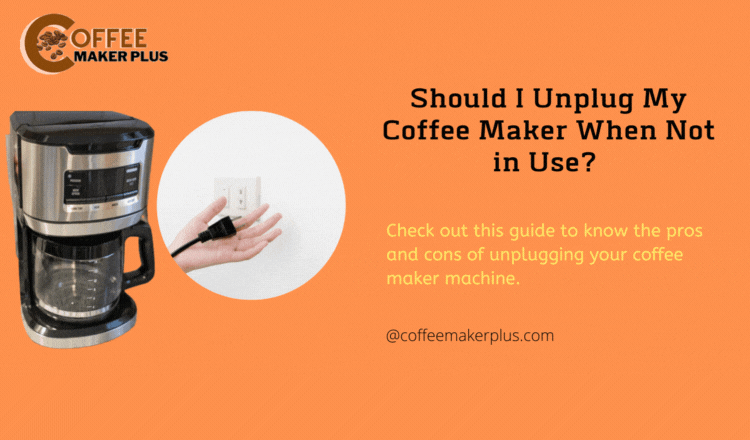
Do you ever unplug your coffee maker when not in use? If so, why? Is it because you’re worried about a power outage? Or is it because you don’t want to waste energy? In this blog post, I’ll discuss the pros and cons of unplugging your coffee maker when not in use and guidelines on when to do so. I’ll also share which type of coffee maker should be unplugged and how often. Finally, I’ll provide some tips on how to conserve energy without unplugging your coffee maker too often. So read on to find all you need to know about unplugging your coffee maker!
Table of Contents
When to Unplug Your Coffee Maker
Wasting energy is never good, including wasting energy on our appliances. That’s why it’s imperative to unplug your coffee maker when not in use. This will not only help save energy but also protect the environment. For those of you who will be away from home for an extended period, unplug it before leaving. And lastly, if you’re sleeping during the night, do not leave your coffee maker on standby- this will waste energy and money!
Which Type of Coffee Maker Should I Unplug When Not in Use?
There’s no need to fret when it comes to unplugging your coffee maker, it just needs to be done occasionally. However, it’s always a good idea to switch off your drip coffee maker when not in use. This will help to avoid any potential water damage. For espresso machines, unplugging them when not in use is the right precaution to take. This is because espresso machines use a lot of water, and switching them off will help prevent any damage. For French press coffee makers, unplugging it when not in use is not necessary as they don’t use a lot of water. As for all other coffee machines, they can stay plugged in – they just need to be emptied and cleaned occasionally (like every 3-4 weeks).
How Often Should You Unplug Your Coffee Maker?
For a logical reason, coffee is one of the most popular beverages on the planet. Not to mention, it’s a great way to start the day. However, like with any appliance, it’s essential to be mindful of how often you should switch off your coffee maker. Generally, if you’re not using it for more than an hour or two, it’s safe to leave it plugged in. How often you unplug your coffee maker depends on the model and how frequently it brews coffee. If you have a model that allows automatic shutoff, turn that feature off when not in use! And lastly, when not in use, unplug your coffee maker to avoid potential damage.
The Pros and Cons of Unplugging Your Coffee Maker When Not in Use
For a valid reason, coffee is one of the most popular drinks in the world. It’s a great way to start the day and tastes delicious. However, a few things to consider before unplugging your coffee maker when not in use. These include the potential for fire and having to replace the machine cheaper if it does break down. Unplugging your coffee maker can also extend its life by up to 600%. But, there are also some cons to unplugging your coffee maker. For example, it may not beep when unplugged, leading to appliance accidents. Ultimately, it’s up to you to decide whether unplugging your coffee maker when not in use is a good idea. But, considering all the pros and cons is always a good idea!
Conclusion
Having read through this detailed guide, you can now make an informed decision about whether or not to unplug your coffee maker when not in use. Whether you’re a coffee lover or not, unplugging your appliance can help to save energy and keep your device in good condition. However, consult your appliance’s manual to know which type of coffee maker should be switched off when not in use. We hope you found this guide helpful and that you’ll start unplugging your coffee maker when not in use from now on!
FAQs
Why is it important to unplug my coffee maker when not in use?
It’s important to unplug your coffee maker when not in use for a few reasons.
- By unplugging your coffee maker when not in use, you’ll reduce your electric bill. This is because your coffee maker uses a lot of power to run.
- By unplugging your coffee maker when not in use, you’ll also reduce the energy used each month. This is because appliances typically use more energy when they’re overloaded or left on unnecessarily.
- Unplugging your coffee maker when not in use will prevent it from getting overloaded with electricity and potentially causing a fire.
What are some other dangers of leaving a hot appliance plugged in?
Besides the danger of electric shock or fire, there are other dangers of leaving appliances plugged in. These include:
- Overheating your coffee maker can cause it to break, posing a fire hazard.
- Unplugging appliances when not in use can save you money on your electricity bill and hassle.
- Other appliances that may be left plugged in when not in use include stereos, TVs, and computers.
- Leaving appliances plugged in wastes energy, as these appliances constantly draw power from the grid even when not used.
When Should I Unplug My Coffee Maker to Avoid any Electrical Shock?
When removing parts from an appliance, like your coffee maker, make sure to unplug it before doing so for electrical safety reasons. Unplugging other appliances within 2 feet of your coffee maker is also an excellent practice. If you’re not using your coffee maker, flip the switch to the off position.